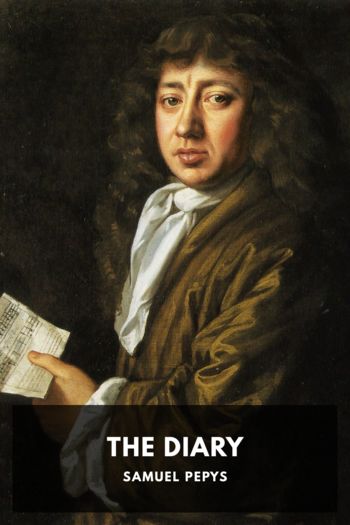The Diary, Samuel Pepys [e reader books TXT] 📗

- Author: Samuel Pepys
Book online «The Diary, Samuel Pepys [e reader books TXT] 📗». Author Samuel Pepys
Although modern numismatists may smile at the preference given by Mr. Slingsby to Rotier’s coins, Pepys’s remark that Oliver’s crowns were then selling at 25s. or 30s. is very curious, for it is to this day considered doubtful whether these beautiful pieces by Simon were current coin or pattern pieces. Snelling, in his Silver Coinage, 1762, calls them “very scarce,” and so they remain, as the prices which they still bring at sales seem to show, varying from £2 10s. to £11, according to condition.
Mr. Joseph Gibbs of the Inner Temple, who kindly furnished the above remarks, has one of the crowns without any flaw, for which he paid £4 18s.; and Mr. Cureton, the coin collector, had six sets of these moneys at the time he was robbed and nearly murdered, in the winter of 1S50. Pepys’s evidence of the high value of the crowns in 1663 strengthens the idea that they were pattern pieces only. There is a tradition that the die became cracked across the neck after a few impressions were struck, which having been considered ominous, the issue was stopped; but the truth of the story must still remain matter of conjecture. —B. ↩
Bewpers is the old name for bunting. ↩
For ingenious. The distinction of the two words ingenious and ingenuous by which the former indicates mental, and the second moral qualities, was not made in Pepys’s day. ↩
The old Admiralty Court was formerly held on St. Margaret’s Hill, in part of the old church of St. Margaret, and was removed to Doctors’ Commons about 1675. ↩
Dr. Thomas Exton, Dean of the Arches and Judge of the Admiralty Court. —B. ↩
Sir John Robinson. ↩
Sir Giles Strangways, M.P. for Dorsetshire, or John Strangways, M.P. for Bridport. ↩
Probably Sir Richard Lloyd, M.P. for Radnorshire. —B. ↩
A fool, or heavy stupid fellow. “What makes you stare so, bufflehead!”—Plantus’s Comedies Made English, 1694. “Buffle-headed” was also used to signify stupid. ↩
Cannon Street. ↩
There is a token of “the coffeehouse at the west end of St. Paul’s London,” which is probably the house referred to by Pepys (see Boyne’s Tokens, ed. Williamson, vol. i, p. 736). ↩
Great dissatisfaction was felt by the Presbyterians in Ireland with the action of the English Commissioners appointed to hear causes in connection with the Act of Settlement. ↩
See note 917. ↩
Sir Robert Long, who came of an ancient family in Wiltshire, had been secretary to Charles II during his exile, and was subsequently made Auditor of the Exchequer and a Privy Councillor, and created a baronet in 1662, with remainder to his nephew James. He died unmarried in 1673. —B. ↩
Mrs. Ferrers. ↩
Colonel Williams—“Cromwell that was”—appears to have been Henry Cromwell, grandson of Sir Oliver Cromwell, and first cousin, once removed, to the Protector. He was seated at Bodsey House, in the parish of Ramsey, which had been his father’s residence, and held the commission of a colonel. He served in several Parliaments for Huntingdonshire, voting, in 1660, for the restoration of the monarchy; and as he knew the name of Cromwell would not be grateful to the Court, he disused it, and assumed that of Williams, which had belonged to his ancestors; and he is so styled in a list of knights of the proposed Order of the Royal Oak. He died at Huntingdon, 3rd August, 1673. (Abridged from Noble’s Memoirs of the Cromwells, vol. i, p. 70.) —B. ↩
Lord Rutherford was created Earl of Teviot in 1663, and Pepys refers to him sometimes as Lord Rutherford and sometimes as Lord Tiviot. See note 1630. ↩
The thermometer was invented in the sixteenth century, but it is disputed who the inventor was. The claims of Santorio are supported by Borelli and Malpighi, while the title of Cornelius Drebbel is considered undoubted by Boerhaave. Galileo’s air thermometer, made before 1597, was the foundation of accurate thermometry. Galileo also invented the alcohol thermometer about 1611 or 1612. Spirit thermometers were made for the Accademia del Cimento, and described in the Memoirs of that academy. When the academy was dissolved by order of the Pope, some of these thermometers were packed away in a box, and were not discovered until early in the nineteenth century. Robert Hooke describes the manufacture and graduation of thermometers in his Micrographia (1665). ↩
See note 1071. ↩
Stemples, cross pieces which are put into a frame of woodwork to cure and strengthen a shaft. ↩
See note 678. ↩
A villain or scoundrel; the cant term for a thief. ↩
See note 88. ↩
The company drove round and round the Ring in Hyde Park. The following two extracts illustrate this, and the second one shows how the circuit was called the Tour:
“Here (1697) the people of fashion take the diversion of the Ring. In a pretty high place, which lies very open, they have surrounded a circumference of two or three hundred paces diameter with a sorry kind of balustrade, or rather with postes placed upon stakes but three feet from the ground; and the coaches drive round this. When they have turned for some time round one way they face about and turn t’other: so rowls the world!”
Wilson’s Memoirs, 1719, p. 126“It is in this Park where the Grand





Comments (0)